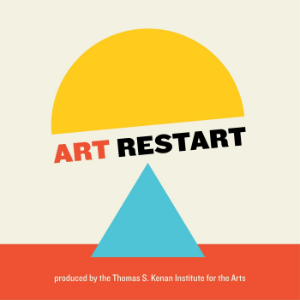
Art Restart
Arts & Culture Podcasts
Host Pier Carlo Talenti interviews artists who – whatever they make, wherever they work – are shaking up the status quo in their fields and their communities. Art Restart is produced by the Thomas S. Kenan Institute for the Arts at the University of North Carolina School of the Arts. The views and opinions expressed by speakers and presenters in connection with Art Restart are their own, and not an endorsement by the Thomas S. Kenan Institute for the Arts and the UNC School of the Arts. Hosted by Ausha. See ausha.co/privacy-policy for more information.
Location:
United States
Genres:
Arts & Culture Podcasts
Description:
Host Pier Carlo Talenti interviews artists who – whatever they make, wherever they work – are shaking up the status quo in their fields and their communities. Art Restart is produced by the Thomas S. Kenan Institute for the Arts at the University of North Carolina School of the Arts. The views and opinions expressed by speakers and presenters in connection with Art Restart are their own, and not an endorsement by the Thomas S. Kenan Institute for the Arts and the UNC School of the Arts. Hosted by Ausha. See ausha.co/privacy-policy for more information.
Language:
English
Email:
kenanarts@uncsa.edu
Damian Stamer Paints with Intelligence, Artificial and Human.
Duration:00:27:47
Inside and Outside the Box with Sherrill Roland
Duration:00:27:03
Funding the Invisible: Esther Hernandez on Artists’ Labor
Duration:00:28:58
Indigenous Ingenuity in Architecture: Wanda Dalla Costa
Duration:00:28:49
Dancing in All Senses: Davian Robinson
Duration:00:29:42
Wellspring of Change: Shanai Matteson on Art and Place
Duration:00:27:23
The Art of Virtual Interventions: Angela Washko
Duration:00:29:19
Immersive Theater Wins 21st-Century Fans: Artistic Director Graham Wetterhahn
Duration:00:24:47
Conductor Jessica Bejarano Wields a Bold Baton
Duration:00:26:32
Choreographing First-Gen Stories: Alfonso Cervera and Irvin Gonzalez
Duration:00:26:11
Trust, Joy and the Cello: Joshua Roman on Music and Healing
Duration:00:27:09
Filmmaker Cyrus Moussavi Finds Stories Where the Music Lives
Duration:00:29:02
Curator Coka Treviño Talks Big Medium, Huge Loss
Duration:00:26:14
Ryan J. Haddad Claims His Spotlight and Access for All
Duration:00:26:59
Filmmaker Carlos López Estrada Uplifts Indie Voices with Antigravity
Duration:00:29:11
Every Stitch an Immigrant Story: fiber artist Maria Amalia Wood
Duration:00:30:02
Small School, Big Vision: JP Reuer’s New Educational Path for Artists
Duration:00:25:25
The Art of Land Back: James McAnally and Anita Fields on a historic rematriation to Osage Nation
Duration:00:30:45
Art 25: a collective with joy and independence at its heart
Duration:00:27:56
Violinist Johnny Gandelsman gets scared ... and new music benefits.
Duration:00:28:34